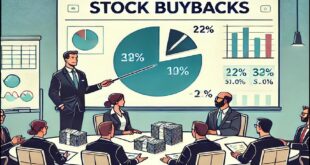Even seasoned U.S. investors can make basic (and wrong) assumptions and generalizations when it comes to  investing internationally. Here are a few common traps that investors tend to fall into when they start looking outside their own country’s borders.
investing internationally. Here are a few common traps that investors tend to fall into when they start looking outside their own country’s borders.
The following article is presented by Lorimer Wilson, editor of www.munKNEE.com (Your Key to Making Money!) and the FREE Market Intelligence Report newsletter (sample here) and has been edited, abridged and/or reformatted (some sub-titles and bold/italics emphases) for the sake of clarity and brevity to ensure a fast and easy read. This paragraph must be included in any article re-posting to avoid copyright infringement.
Gibley goes on to say in further edited excerpts:
Mistake #1: Confusing a country’s economy with its stock market
A growing economy doesn’t guarantee a bull market in stocks, nor does a sputtering economy guarantee a bear market. Here’s why:
- Economic growth can accelerate wage increases, which can reduce a company’s profit margins. We’ve recently seen this in China, where lower corporate profit margins have been bad for stock prices.
- Steady economic growth is good. But rapid growth can ignite inflation, which can in turn force central banks to raise rates—typically a negative for stocks.
- High-growth economies often need capital infusions to keep expansions in motion. As a result, dilution from the issuance of new shares can cut into equity returns.
- Sometimes, government reforms that improve the long-term economic outlook can cause short-term pain for big players in the stock market. Mexico is an example here: President Peña Nieto’s anti-monopoly reforms could boost investment and improve prices for consumers. But it could also reduce the profits of the largest companies in the Mexican stock market.
- Sentiment and valuation matter. Weak economies can generate robust stock returns if sentiment becomes too negative. Greece had the highest stock market return in Europe in 2012, despite being in its fifth consecutive year of recession and having received two bailouts. By contrast, the emerging market stock index had a high valuation in early 2013 but underperformed when high expectations weren’t met.
Mistake #2: Not researching what’s actually in a country’s index
You may not be getting as much diversification as you think when you invest in a country-specific index exchange traded fund (ETF) or mutual fund.
- Some stock markets may be overweight in certain sectors. For example, over 40% of the listings in the Spanish and Chinese stock markets are financials. The Swiss stock market has over 30% of its listings in health care. If you buy an index fund of these countries, you may end up overweight in financials or health care.
- Some stock markets are fairly small, and as a result, one or a few large companies dominate the index. Invest in the country index fund and you’re primarily investing in a handful of companies.
- Government-owned companies can have large weights in indexes, particularly in emerging market countries with less mature stock markets. These companies may be inefficient or run for the benefit of the citizens of the country rather than shareholders. For example, a company may be subject to price controls, which keeps down prices for domestic consumers but can also keep a lid on corporate profits.
- Some stock market valuations may be cheap for a reason. For example, the Russian stock market has been attractively valued for some time, but a high energy weight, in addition to the poor rule of law, has contributed to its valuation discount.
Mistake #3: Ignoring currency differences
Currency exposure is part of the diversification benefit of investing internationally. Some factors to consider:
- Currency can have a big impact on returns. For example, in 2013, the Japanese Nikkei 225 stock market returned 59.4% in yen terms, but only 30.6% in U.S. dollar terms, due to the 17.6% weakness in the yen relative to the dollar. In cases where a significant currency move is anticipated (like it was in Japan), currency hedging makes sense. There are now currency-hedged funds—funds that give investors exposure to a stock market and remove the influence of currency translation—to reduce the impact of currency on returns.
- A weak dollar tends to be good for U.S.-based investors. If you invest internationally when the dollar is weak, your international stock returns will be worth more when converted back into U.S. dollars.
- Foreign currency exposure, like any layer of diversification, can smooth out returns for a portfolio by adding investments that can move differently in response to different market and geopolitical conditions.
Mistake #4: Substituting U.S. multinationals for international investments
There are benefits from investing in U.S. multinational companies (MNCs), including their adherence to U.S. tax laws and accounting standards, more consistent dividend policies from year to year, and potentially higher profit margins due to being a mature business in the U.S. but investing in multinationals isn’t the same as investing internationally:
- The stocks of U.S. multinational companies tend to move in tandem with other U.S. stocks, and U.S. multinationals typically still derive a large percentage of their profits from the United States. But this misses the point of investing internationally—to diversify into areas that aren’t so highly correlated with the U.S. market.
- Similarly, multinationals have a greater tendency to hedge currency exposure—and one reason to invest internationally is to increase your currency diversification, not reduce it.
- U.S. multinationals may not do as well as local competitors in their target foreign markets due to cultural and local differences. After all, not everyone prefers U.S. brands, and some U.S. companies have difficulty customizing products for foreign markets.
- The U.S. share of the global stock market is declining, so investing in U.S. multinationals means missing out on different opportunities elsewhere. When you look at global GDP, non-U.S. countries dominate, indicating the market share of these countries has room to grow.
- Owning large multinational companies means excluding small cap companies that are more closely tied to the economic conditions in their local markets. International small cap stocks have even lower correlations to U.S stocks than large cap international stocks.
Non-U.S. stocks [are] becoming a bigger piece of the global pie.
Sources: MSCI and International Monetary Fund World Economic Outlook Database April 2014. Figures show the market share of the U.S. relative to the globe overall in terms of both market cap and GDP. Data as of December 2013.
Don’t fall victim to “home country bias”
Investors are sometimes nervous about investing internationally because:
- they’re not as familiar with the companies, economies or policies in other countries…
- they may look at increasing correlations and decide that the diversification benefits of international investing aren’t as compelling anymore. While it’s true that correlations have increased, foreign companies don’t trade as closely in tandem as domestic companies, so there is still a diversification benefit.
Some factors to take into account to ease your concerns about investing internationally:
- You don’t need to trade on foreign exchanges in order to invest internationally.
- Some foreign stocks are listed in the U.S. as American Depositary Receipts (ADRs) or can be traded over the counter in U.S. dollars. If you’re a Schwab client, you can do both through your traditional Schwab brokerage account.
- On the other hand, if you want to trade on foreign exchanges, the Schwab Global Account lets you trade directly online in 12 foreign markets in their local currencies. Note that the Schwab Global Account is only good for taxable accounts—not for IRAs or similar tax-advantaged accounts.
- You don’t have to select individual stocks. ETFs or mutual funds can be a great way to diversify and gain foreign exposure.
I hope this enhanced your understanding of international investing.
Editor’s Note: The author’s views and conclusions in the above article are unaltered and no personal comments have been included to maintain the integrity of the original post. Furthermore, the views, conclusions and any recommendations offered in this article are not to be construed as an endorsement of such by the editor.
*Article printed from AdvisorAnalyst Views: http://www.advisoranalyst.com/glablog; URL to article: http://www.advisoranalyst.com/glablog/2014/05/30/4-mistakes-to-avoid-in-international-investing.html (Copyright 2007 – 2014 AdvisorAnalyst.com / All rights reserved )
Disagree? Concur? Have your say on the subject via:
We’d like to know what you have to say.
Related Articles:
1. The “Gone Fishin’” Portfolio Has Compounded at 17.3% a Year! Here Are the Details
I can’t predict the future, and neither can you. That’s why I created the Gone Fishin’ Portfolio. It’s breathtakingly simple, works like a charm and has beaten the S&P 500 every year, while taking much less risk than being fully invested in stocks. Read More »
2. Investment Truths: “Does a 10% Loss + a 10% Gain Put You Back to Even?” & 29 Other Insights
Here’s my list of the most common errors investors make and some related maxims. Read More »
 munKNEE.com Your Key to Making Money
munKNEE.com Your Key to Making Money


